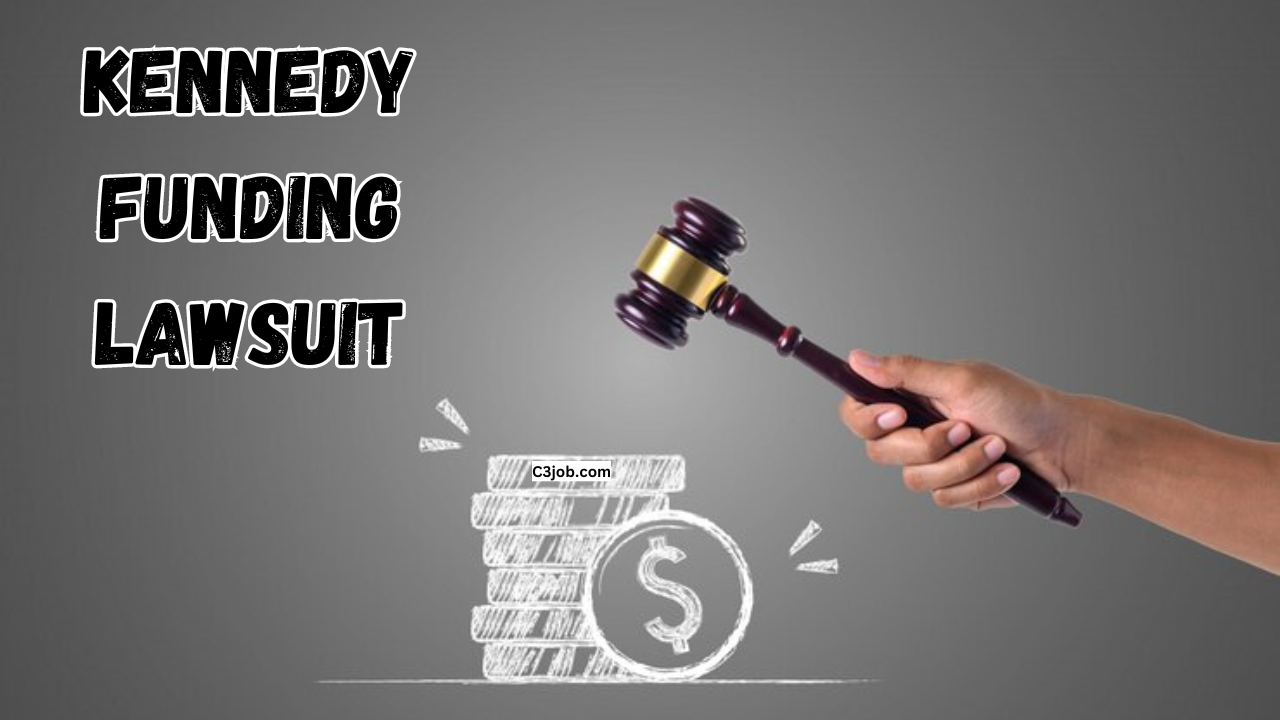The Kennedy Funding lawsuit has sent ripples through the real estate lending industry, raising significant questions about lending practices, legal accountability, and the broader implications for financial institutions involved in real estate transactions. As a well-known name in the sector, Kennedy Funding is a direct private lender specializing in short-term loans, particularly for real estate projects that fall outside conventional financing options. This case has sparked intense scrutiny, not only for the company itself but also for the practices and regulatory frameworks governing real estate lending.
In this article, we will explore the key details of the Kennedy Funding lawsuit, the nature of the dispute, and its potential impact on the real estate and financial sectors. We’ll look at the background, legal claims, responses from Kennedy Funding, and the broader context within the lending industry.
What is Kennedy Funding?
Kennedy Funding is a prominent real estate lender, known for its expertise in high-risk, short-term loans primarily for commercial real estate, land acquisition, and development projects. The company, based in New Jersey, has built a reputation for offering flexible financing options to borrowers who may not qualify for traditional bank loans. By providing quick access to capital, Kennedy Funding fills a niche in the market for high-risk loans, often funding projects that other financial institutions might shy away from.
The company is particularly known for handling complex real estate deals involving international borrowers, non-traditional assets, and distressed properties. Its fast approval process and ability to fund deals in a short timeframe have made Kennedy Funding a go-to option for borrowers facing tight deadlines or unique financial circumstances. However, this approach has also brought with it legal challenges and disputes, as seen in the Kennedy Funding lawsuit.
Background of the Kennedy Funding Lawsuit
The Kennedy Funding lawsuit stems from a series of legal and financial disputes that have arisen over the company’s lending practices. While the exact details of the case vary depending on the specific allegations and parties involved, the core issue revolves around claims related to loan terms, misrepresentation, and breach of contract. Borrowers have accused the company of not honoring agreed-upon terms or engaging in practices that unfairly benefited the lender at the borrower’s expense.
This case is one of several legal challenges Kennedy Funding has faced over the years, but its scope and potential impact have made it a focal point of media attention. The lawsuit highlights the tensions between private lenders and borrowers, especially when deals involve high-risk projects with significant financial stakes.
The Nature of the Legal Dispute
The Kennedy Funding lawsuit involves allegations of contractual violations, fraud, and misrepresentation. Borrowers claim that the lender did not fully disclose the terms of the loans or altered agreements without their knowledge. Some have alleged that the interest rates, fees, and penalties associated with their loans were excessive or not clearly explained before signing. In certain cases, there are accusations that Kennedy Funding engaged in practices designed to push borrowers into default, enabling the company to seize collateral.
These claims point to broader concerns about transparency and fair dealing in the real estate lending sector, especially when dealing with high-risk loans that are often underwritten outside the bounds of traditional financial regulations. The lawsuit has sparked discussions about the responsibilities of lenders to clearly communicate loan terms and the legal protections available to borrowers in such disputes.
Key Players in the Kennedy Funding Lawsuit
At the center of the case is Kennedy Funding, the private lender accused of improper business practices. The opposing parties typically include borrowers and business entities that entered into loan agreements with the company. In some instances, third-party stakeholders, such as contractors, developers, and real estate firms, may also be involved, depending on the nature of the dispute.
Legal teams representing both Kennedy Funding and the plaintiffs have been engaged in a battle over contractual interpretation, financial documentation, and the events leading up to the lawsuit. Some cases have drawn in regulatory bodies or consumer protection organizations, particularly if the dispute involves claims of fraud or misleading business practices that could affect broader market stability.
Allegations Against Kennedy Funding
The main allegations against Kennedy Funding include misrepresentation of loan terms, fraud, and unethical lending practices. Borrowers claim that the company failed to provide clear information regarding the true cost of the loans, including hidden fees and penalties that dramatically increased the financial burden on borrowers. In some cases, there are accusations that the company engaged in predatory lending, offering terms designed to lead to default so that it could seize valuable assets or properties used as collateral.
Additionally, some lawsuits have accused Kennedy Funding of breaching the terms of loan agreements, either by changing interest rates without notice or failing to disburse funds in accordance with the original contract. These allegations point to broader concerns about transparency and fairness in private lending, particularly in high-stakes real estate deals where the borrower’s financial future is on the line.
Kennedy Funding’s Defense and Response
In response to the lawsuit, Kennedy Funding has strongly denied any wrongdoing, maintaining that all loan agreements were conducted transparently and according to legal standards. The company argues that the disputes stem from misunderstandings or failures on the part of the borrowers to fulfill their contractual obligations. Kennedy Funding’s legal team has emphasized that the company’s lending practices are standard in the industry, particularly given the high-risk nature of the loans it offers.
The company has also sought to highlight the volatility of the real estate market, noting that many of the projects it finances involve distressed properties or other financially unstable situations. According to Kennedy Funding, many of the legal disputes arise not from fraudulent behavior but from borrowers facing difficulties completing their projects or meeting loan terms in a challenging market environment.
Impact of the Kennedy Funding Lawsuit on the Industry
The Kennedy Funding lawsuit has broader implications for the real estate lending industry, especially as private lenders become more prominent in financing large-scale projects. Legal challenges like this one shine a light on the risks involved in high-stakes real estate transactions, both for lenders and borrowers. They also underscore the need for clearer regulatory guidelines and enhanced transparency in private lending practices, particularly when dealing with international and non-traditional assets.
Real estate developers and investors are watching the case closely, as the outcome could influence future lending practices and shape the legal landscape for similar disputes. The case also raises important questions about borrower protections, especially in a financial environment where traditional banking regulations may not apply to private lenders like Kennedy Funding.
FAQs about Kennedy Funding Lawsuit
What are the main allegations in the Kennedy Funding lawsuit?
The lawsuit includes allegations of misrepresentation, fraud, and breach of contract, with claims that Kennedy Funding did not disclose loan terms clearly and engaged in unethical lending practices.
Who is involved in the lawsuit?
The key parties involved are Kennedy Funding, the private lender, and the borrowers who entered into loan agreements with the company. Legal teams and, in some cases, regulatory bodies may also be involved.
How does this lawsuit impact the real estate lending industry?
The lawsuit highlights the need for clearer regulations and transparency in private lending practices, particularly in high-risk real estate deals, potentially setting new precedents for the industry.
What is Kennedy Funding’s response to the allegations?
Kennedy Funding denies the allegations, stating that all agreements were conducted transparently and according to industry standards. The company argues that the disputes stem from borrower misunderstandings or market volatility.
What are the potential outcomes of the lawsuit?
The outcomes could range from a settlement to a court ruling in favor of either party, with broader implications for how private lenders operate in the real estate market.
Why is this case significant?
The Kennedy Funding lawsuit is significant because it highlights potential issues within the private lending sector, particularly in terms of transparency and borrower protections in high-stakes real estate transactions.
Conclusion
The Kennedy Funding lawsuit serves as a crucial reminder of the complexities and challenges inherent in the real estate lending industry. While private lenders like Kennedy Funding provide valuable services in high-risk financial environments, the case underscores the importance of clear communication, transparency, and accountability in loan agreements. As the legal battle unfolds, its outcome will likely have lasting effects on both the company and the broader real estate sector, influencing future lending practices and shaping the regulatory landscape for years to come.











